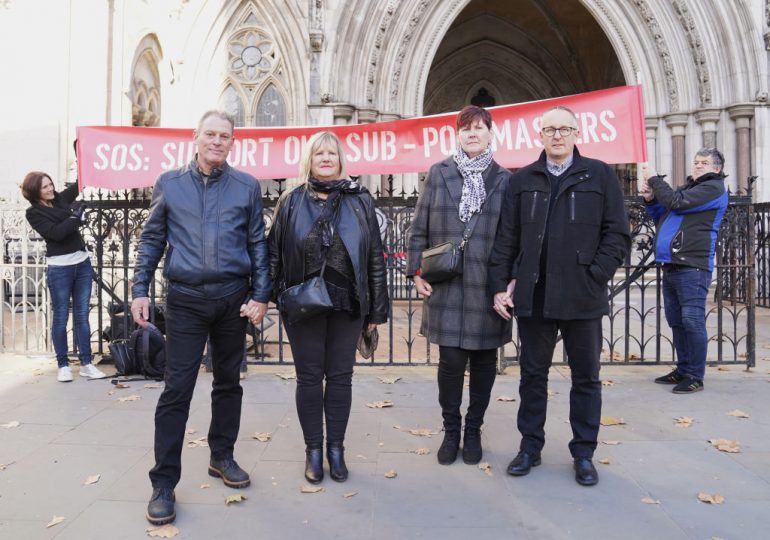Metropolitan Police are investigating potential offenses of fraud, perjury and perverting the course of justice related to a years-long scandal where the Post Office wrongfully convicted its employees because of faulty software. The saga, commonly referred to as the “Post Office scandal,” is at the forefront of the public’s mind once again, following the TV series Mr Bates vs the Post Office airing on U.K. TV. The show, and the attention surrounding it, has brought forward new potential victims.
[time-brightcove not-tgx=”true”]
Police opened an investigation in January 2020 into matters concerning Fujitsu Horizon, the name of the company and its software, and the Post Office following a referral from the Director of Public Prosecutions, the Met Police tells TIME in an email.
The potential offenses come from investigations and prosecutions carried out by the Post Office, for example money recovered from sub-postmasters as a result of the office’s prosecutions or civil actions, the law enforcement agency says. Two people have been interviewed in the investigation as of Saturday, police say.
TIME reached out to the Post Office for comment.
The scandal saw hundreds of post office employees wrongfully accused after software showed discrepancies in the Post Office’s finances, in what the Criminal Cases Review Commission called the “most widespread miscarriage of justice the CCRC has ever seen and represents the biggest single series of wrongful convictions in British legal history.”
Here’s what you need to know.
What is the Post Office scandal involving Horizon IT?
Japanese tech company Fujitsu Services developed and began operating the Horizon IT financial software services for the Post Office in 1999. Employees said they reported issues with the software from the start, but claimed the Post Office brushed off their concerns or said the issues were the fault of the individual branch managers.
CCRC, which reviewed the wrongful convictions, said that “Horizon appeared to have significant bugs which could cause the system to misreport, sometimes involving substantial sums of money which sub-postmasters found difficult to challenge as they were unable to access information about the software to do so.”
As a result, between 1999 and 2015, more than 700 sub-postmasters were accused of wrongdoing, leading to prosecutions, criminal convictions and, in some cases, prison sentences, the BBC reported. Postmasters found guilty were ordered to pay the Post Office for the money they were accused of stealing, leading in some cases to bankruptcy and financial ruin. Victims and their families have reported that wrongful convictions contributed to addiction, illness and suicides.
Computer Weekly first reported issues with the Horizon software that caused it to incorrectly state the amount of cash on the premises of a post office in 2009, the same year aggrieved employees formed the Justice for Subpostmasters Alliance Group to fight for justice.
In 2016, sub-postmasters initiated civil proceedings against the Post Office, which more than 500 employees eventually joined. The group won its case in the High Court in 2019 and the Post Office agreed to pay damages.
As of December, the government has paid out £124.7 million ($158.6 million) in compensation to wrongfully convicted postmasters. The number of individuals with overturned convictions who have received full and final compensation is 25, according to the Post Office.
In September, the government announced it was raising its compensation to £600,000 ($763,500) for every victim. Offers have been made to all 2,417 current or former postmasters under the Horizon Shortfall Scheme.
What’s the TV show and its impact?
The TV show, starring Toby Jones as former sub-postmaster Alan Bates, who led the campaign for justice at the High Court, aired from Jan. 1 to Jan. 4. Following the premiere of the mini-series, 50 new potential victims have come forward, Neil Hudgell, a lawyer on behalf of claimants, told the BBC.
Post Office Chief Executive Nick Read said in a statement on the agency’s website that he hoped the TV show “encourages anyone affected who has not yet come forward to seek the redress and compensation they deserve.”
The TV show has grown public sympathy for victims as well as demands for accountability.
Who’s been held responsible?
Nobody from the Post Office or Fujitsu had been held accountable as of last year.
In 2019, the High Court ruled that the original Horizon system had encountered a number of bugs and errors. When handing down his judgment, Mr. Justice Fraser shared that he would be expressing his “grave concerns” over the case to the Director of Public Prosecutions. The DPP forwarded Mr. Justice Fraser’s letter to the police, who are responsible for investigating potential crimes.
An official inquiry into the scandal has been ongoing since 2020, led by retired high court judge Sir Wyn Williams. The Met Police tells TIME their investigation is “considering the actions of individuals connected with Fujitsu and the Post Office” and that they are an “interested party to the public inquiry and are monitoring and gathering the evidence it hears.”
After the High Court ruling, the Post Office’s CEO Paula Vennells said in a statement that she was “truly sorry for the suffering caused.” She stepped down that year with a CBE (Commander of the Order of the British Empire). As of Saturday, more than 700,000 people had signed an online petition to strip Vennells of her CBE—compared to 1,000 signers before the TV show aired, Sky News reported.
Since the scandal, the government extended its contract for Horizon with Fujitsu.
Leave a comment








